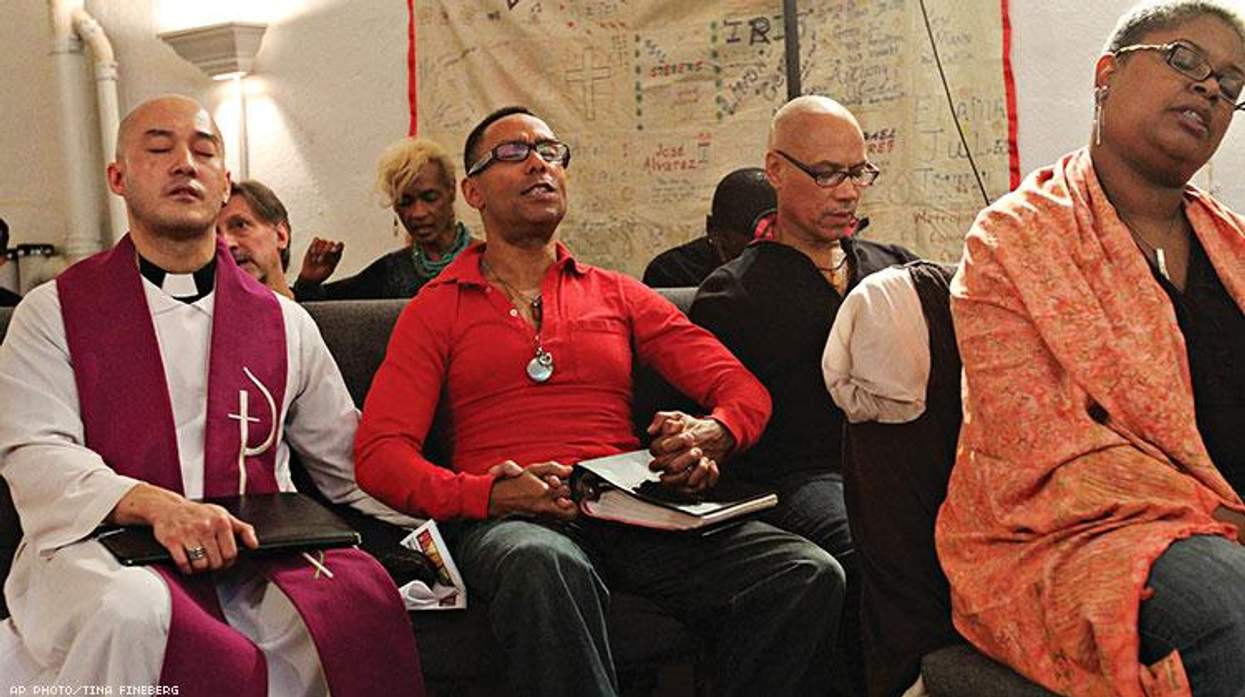Following a messy separation agreement between the Metropolitan Community Churches and Rev. Darlene Garner, the first black person to serve on the organization's Council of Elders, one question remains: Can affirming churches serve as safe places of worship for LGBT minorities?
Interim Moderator Rev. Elder Rachelle Brown says providing a positive environment for minorities remains a critical mission for the church. "Queer people of color have found a home in MCC since our early days," Brown says. "Today, when you go into almost all MCC congregations, you will find racial diversity, and you will find Catholics, Baptists, Pentecostals, and members with many other [spiritual] backgrounds."
The church announced in January that Garner had officially retired from the organization at the first of the year. But that news came after months of public and cantankerous wrangling between Garner and the institution where she has held clergy credentials for 29 years.
Garner's camp maintains that MCC failed to treat her respectfully, but things turned especially heated after an email miscommunication about legal deadlines led Garner's legal team to threaten to file a discrimination complaint against the church. Several MCC governing board members, one of whom was a person of color, left to protest Garner's termination. There are now new people of color on the board, with the appointments of Rev. Victoria L. Burson, Rev. Miak Siew, and Dr. David L. Williams, all of whom Garner has praised.
"Let us hope that the work of inclusion to which we have committed ourselves will be fulfilled in these appointments," a Garner spokeswoman wrote on Facebook. Even after Garner signed a separation agreement with MCC in late January, it was clear the dispute had taken an emotional toll.
"As a 69-year-old lesbian of color, Rev. Garner is not immune or new to discrimination," Garner's attorney, Robert Carr, said in a statement. "After working at MCC for almost 20 years, one would think that Rev. Garner would have, at least, earned more respect at the end of her career."
As recently as 2016, Garner had been under consideration to be MCC's third moderator (essentially the head of the church). While a vote failed to pick a majority favorite to lead the institution, Garner came in second among four finalists -- only to see Brown hired to serve in an interim position (which she has held since).
Over the course of 2017, MCC leaders discussed the need for a more widespread focus on issues like institutional privilege. Brown notes that having a full-time professional who addresses issues like racism and discrimination is now regarded as a best practice. That decision reportedly led to a restructuring at MCC on August 31.
Still, the process has cast a shadow of resentment. "This process has clearly exposed some of MCC's warts and the professional leadership needed to turnaround this organization for the better," says Carr. "It's important for MCC leadership to begin its long journey toward facing the institutional biases that are diametrically opposed to the very mission and values that the organization was founded on."
Brown, for her part, has expressed frustration at the perceptions around Garner's departure, saying much of the leadership changes stemmed from growing pains.
"MCC is on the cutting edge of diversity relative to almost any other LGBTQI group," Brown says. "MCC has grown from a circle of about 12 people in 1968 to a global network with dozens of ministries in Latin America, Europe, Australia, Malaysia, the Philippines, South Africa, and more. Our goal is not to eliminate conflict but to facilitate direct communication between the people who are struggling with each other in hopes of coming to some agreement."
For a time, Garner continued to hold a spot on the Council of Elders for MCC, Brown points out, even if the restructuring cost her a paid staff position. But the reorganization needed to happen when it did, Brown says, because "MCC's global survival requires timely action." Garner resigned from the Council of Elders in March.
In the age of Trump, the LGBT-affirming church sees itself playing a greater role in fighting for social justice. "[Trump's] appointees have been overwhelmingly anti-LGBTQI. His immigration and refugee policies make it more difficult than ever to escape persecution, assault, and imprisonment for being queer," Brown says. "Our ministries in Uganda, Kenya, Malaysia, and Eastern Europe face life-threatening situations that sometimes requires seeking asylum. Our clergy and church members have been in demonstrations across this country to protest these policies, and we will not stop until change happens."
Congregants of color could say the same thing about their commitment to seeing lasting changes at MCC.




































































Charlie Kirk DID say stoning gay people was the 'perfect law' — and these other heinous quotes